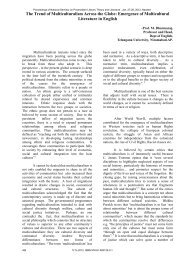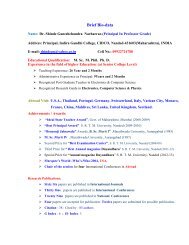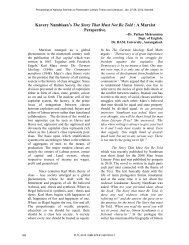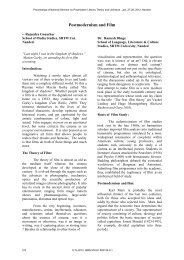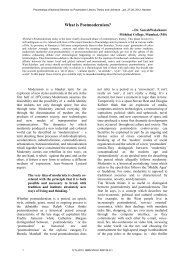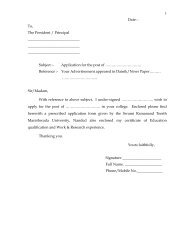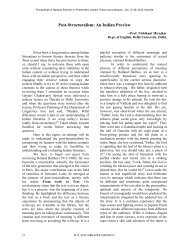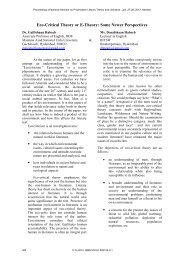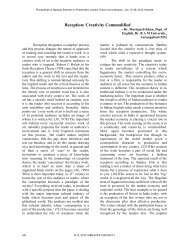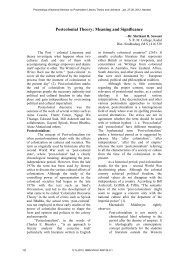Proceedings of National Seminar on Postmodern Literary <strong>Theory</strong> and Literature , Jan. 27-28, 2012, Nandedcut (lie nose and breasts of Ill's wife, while ignoring the Patil’s. The dichotomy between male andfemale vis-a-vis the liaisons shows patriarchy within the dalit l society, Feminism persaptive seems tobe absent from the autobiography Nowhere does the women portrayed in it show group awareness; asfemales and held males responsible for their woes. The focus of the book is primarily on theexperience of living as a dalit and caste is seen as the deciding factor. If a person is seen asaggravating the suffering of his women, it is only individually and not collectively and species or agroup. Undeniably the portrayal of women, particularly Shantamai and Masamai shows signs ofcompassion, the women question are largely missing from the text. Does the writer does it knowinglyor because his attention is largel focused on his situation as akkarmashi and caste concerns? I thinkthe answer lies somewhere between the tow. While as a male it is perhaps more difficult for him toappreciate and empathise with the women in the narrative – the writer largely models them on thetraditional roles of mother as earth – the main reason lies in his preoccupation with the caste as adecisive disabling factor in our society.REFERENCES1. <strong>An</strong>upama Rao, “Introduction : Caste, gender and Indian Feminism,” ed. <strong>An</strong>upama Rao(New Delhi: Kali for Women & Women unlimited, 2003)2. <strong>An</strong>upama Rao, “Introduction : Caste, Gender and Indian Feminism.”3. <strong>An</strong>upama Rao, “Introduction : Caste, Gender and Indian Feminism.”4. Sharan Kumar Limbale, Akkarmashi Trans. Santosh Bhoomkar (New Delhi: Oxford Uni.Press. 2003) 42.351 PLTL-2012: ISBN 978-81-920120-0-1
Proceedings of National Seminar on Postmodern Literary <strong>Theory</strong> and Literature , Jan. 27-28, 2012, NandedIMPACT OF FEMINISM ON THE POETRY OF W. B. YEATS.INTRODUCTION :Feminism is both an intellectual commitment and a political movement thatseeks justice for women and the end of sexism in all forms. However, there aremany different kinds of feminism. <strong>Feminist</strong>s disagree about what sexism consistsin, and what exactly ought to be done a bout it; they disagree about what it meansto be a woman or a man and what social and political implication gender has orshould have.Nonetheless, motivated by the quest for social justice, feminist inquiryprovides a wide range of perspectives in social, cultural, economic, and politicalphenomena. Important topics for feminist theory and politics include the body,class and work, disability, the family, globalization, human rights, popular culture,race and racism, reproduction, science, the self, sex work, human trafficking, andsexuality.W. B. Yeats (1865-1939) was an Irish poet and playwright, and one of theforemost figures of 20 th century literature. A pillar of both the Irish and Britishliterary establishments, W. B. Yeats is the most powerful voices in modernliterature. He is very potent and have a great impact on the minds of modernreaders. Impact of feminism is seen on his poems.W. B. Yeats struggle begins with his identity: white, protestant, middleclass man of the British Empire who ‘belonged to the dominant literary tradition’.It was an interesting time for Yeats to grow up. The seeds of struggling womenmust have been planted in youth by his father who was a practitioner of JohnStuart Mills, the man who championed the rights of women. When Yeats beganhis literary career in the 1880s, deep and resounding advances for the rights ofwomen were being enacted. In 1870, the ‘Married Women’s Property Act’ waspassed, finally giving married women some sense of relief in securing property.Women also began to acquire greater access to higher education and birthrate felldown as contraception became more widely accessible.But unlike many men of then, Yeats ‘moved in circles sympathetic toemancipation’. Regarding his attitude towards women, it is said and observed that‘Yeats loved, liked, collaborate with, and respected woman most of the time. Heencouraged their intellectual and creative work, assumed their professionalcompetence, chose them as allies, His best friends were all women, ‘MaudeGonne’ is a good case. She was a fierce advocate for girls and women and the352 PLTL-2012: ISBN 978-81-920120-0-1



